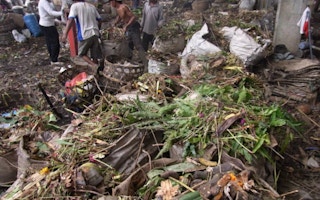An award-winning Indonesian recycling company that repurposes decomposing organic waste is closing amid difficult market conditions.
To continue reading, subscribe to Eco‑Business.
There's something for everyone. We offer a range of subscription plans.
- Access our stories and receive our Insights Weekly newsletter with the free EB Member plan.
- Unlock unlimited access to our content and archive with EB Circle.
- Publish your content with EB Premium.
Bali-based Temesi Recycling was founded in 2004 by Swiss chemical engineer David Kuper, who struck a deal with a landfill site near Ubud to process and recycle organic waste.
The company was partly financed by carbon credits – diverting organic waste from landfill and recycling it prevents the release of potent greenhouse gas methane – and from selling organic compost.
Initially known as the Gianyar Waste Recovery Project, Temesi Recycling was the first Indonesian organisation to complete the Kyoto Protocol’s clean development mechanism process, allowing it to sell carbon credits. It was recognised by the United Nations Environment Programme in 2008 for its work in avoiding the release of 7,671 metric tonnes carbon dioxide equivalent (CO2e) per year.
The firm is closing because it could not compete with subsidised fertilisers and “unfair” market conditions for compost, Sean Nino, Temesi Recycling’s assistant manager, said in a post on LinkedIn on Sunday. Chemical fertilisers are subsidised by 70 to 90 per cent in Indonesia.
“The private sector, top multinationals and local government [in Indonesia] have not contributed enough and there are no tipping fees or any other government mechanisms helping to facilitate and stimulate growth [in the market for recycled products],” said Nino. Tipping fees refer to money paid by those who dispose of waste in a landfill.
“We were producing 30 tonnes of compost a day, but we couldn’t sell it,” he told Eco-Business.
Compost sales only covered about a third of the company’s operational costs and the company has not been able to secure investment to keep going. “They [investment companies] were asking for 20 per cent IRR [return on initial invesment],” he said.
Nino is also co-founder of materials recovery and recycling non-profit sustainable design and engineering firm Mantra Bali, which he continues to run.
The closure of Temesi Recycling comes at a difficult time for recycling firms in Asia, as the low price of oil is making it hard for plastic recyclers to meet their customers’ price demands.
Nino, who has worked in waste management and recycling since the 1990s, said in his post that claims made by organisations working to stop ocean plastic pollution are “not being pursued and [are] for PR purposes only.”
Plastic production in Indonesia has doubled from 20 kilogrammes (kg) a year to 40 kg a year and is growing “exponentially,” he said. Meanwhile, “thousands of tonnes of plastic is leaking into the environment every day.”
A campaign by environmental non-profit Greenpeace pressure governments to cut plastic production by 75 per cent by 2040 “is the best way forward,” Nino said.
“Every country’s ministry of trade and ministry of environment can design product standards and production ban lists. The ministries have the executive power to implement much needed bans, but are captured [blocked] by industry,” he said.










